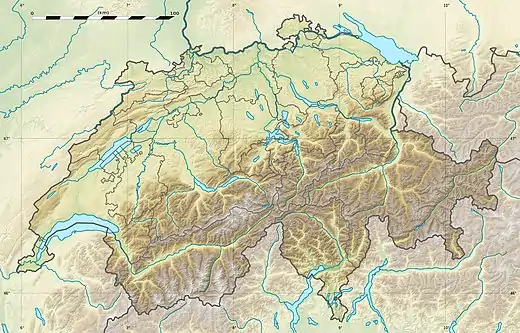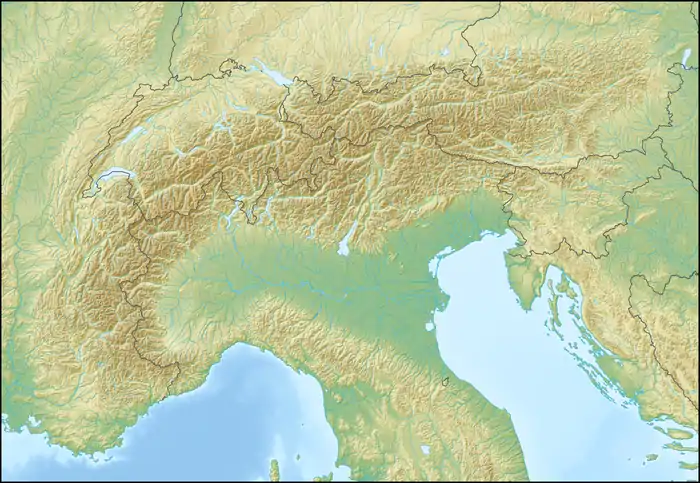Greifensee (lake)
Greifensee is a lake in the canton of Zürich in Switzerland.
| Greifensee | |
|---|---|
 View from north | |
 Greifensee  Greifensee  Greifensee | |
 Map of Greifensee | |
| Location | Canton of Zurich |
| Coordinates | 47°21′N 8°41′E |
| Lake type | eutrophic |
| Primary inflows | (Mönchaltorfer) Aa, Aabach |
| Primary outflows | Glatt |
| Catchment area | 160 square kilometers (62 sq mi) |
| Basin countries | Switzerland |
| Max. length | 6 km (3.7 mi) |
| Max. width | 1.6 km (0.99 mi) |
| Surface area | 8.45 square kilometers (3.26 sq mi) |
| Average depth | 18 m (59 ft) |
| Max. depth | 32 m (105 ft) |
| Water volume | 0.148 km3 (120,000 acre⋅ft) |
| Residence time | 408 days |
| Surface elevation | 435 m (1,427 ft) |
| Settlements | Maur, Niederuster, Fällanden, Mönchaltorf and the town Greifensee |
Geography


Greifensee is located 11 km (6.8 mi) to the east of the city of Zurich, separated by the Pfannenstiel from Lake Zürich. As the second largest lake in the canton of Zurich (Lake Zurich being the largest), it is about 6 km (3.7 mi) long and 1.6 km (0.99 mi) at the widest point, with a maximum depth of 32 m (105 ft). The Aabach (Greifensee) (or just Aa) is the main supplying river, while its outlet is the Glatt. On its southeastern end the Mönchaltorfer Aa (or just Aa) enters the Greifensee.
Points of interest


A boat connects small towns along the edge of the lake, Maur, Niederuster, Fällanden, Mönchaltorf and the town Greifensee with its charming Altstadt and Greifensee castle.
Greifensee is the scene of the Greifensee-Lauf, a semi-marathon around the lake held every year.
Greifensee is a popular recreation area for biking and inline skating on the paved recreation path around the lake. Easy hiking trails follow the water and pass Greifensee castle before entering a nature preserve. There are well maintained bicycle roads all around the lake as well as on the banks of Aabach.
Nature
The lakeside is under UNESCO protection, and buildings are not allowed, resulting in reed bed and a rich fauna and flora: Around 400 plant species in the lake and 19 species in its tributaries. The nature reserves are important for the birds breeding there including more than 120 migratory species.
Cultural Heritage
The lake was known as Glattsee (after the Glatt) in the medieval period[1] Greifensee (Grifense) was at first the name of the fort built by the counts of Rapperswil in the 12th century, recorded as the name of the bailiwick in 1260.[2] This was adopted as the name of the lake by the 16th century.[3]
Located on the lakeshore, the Prehistoric pile dwelling settlement Greifensee–Storen–Wildsberg is part of the 56 Swiss sites of the UNESCO World Heritage Site Prehistoric pile dwellings around the Alps,[4] and the settlement is also listed in the Swiss inventory of cultural property of national and regional significance as a Class object.[5] Because the lake has grown in size over time, the original piles are now around 4 metres (13 ft) to 7 metres (23 ft) under the water level of 406 metres (1,332 ft).
See also
References
- Mure bi Glattese, Orig ZUB VI; 2285; 248 (1294); Mure bi Glatse, Orig ZUB VIII; 3097; 349 (1311).
- The name is presumably from a personal name Grifo, but was etymologised as related to Greif "griffin" from at least the 15th century. Heinrich Meyer, Die Orstnamen des Kantons Zürich: aus den Urkunden gesammelt und erläutert (1848), p. 169.
- von Murr ab dem Gryffensee, GHR 55, 67, 83, 84, 85 (1504); Conradi Türst, De situ Confoederatorum descriptio (1544) "Et iterum dominatum circa paludem Griffense cum vico eiusdem vocabuli ac servitute, qui interseccatur v mille passibus a Turego, de quo ad bis mil. pass, contermina eacdem paludi arx Ustri"
- "Sites Switzerland: Greifensee–Storen/Wildsberg (CH-ZH-02)". palafittes.org. Archived from the original on 2014-10-07. Retrieved 2014-12-10.
- "A-Objekte KGS-Inventar". Schweizerische Eidgenossenschaft, Amt für Bevölkerungsschutz. 2009. Archived from the original on 2010-06-28. Retrieved 2014-12-10.
External links
 Media related to Greifensee at Wikimedia Commons
Media related to Greifensee at Wikimedia Commons- Greifensee (lake) in German, French and Italian in the online Historical Dictionary of Switzerland.
- Schifffahrts-Genossenschaft Greifensee: Boat schedules (in German)
- Waterlevels at Greifensee